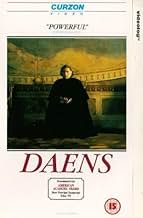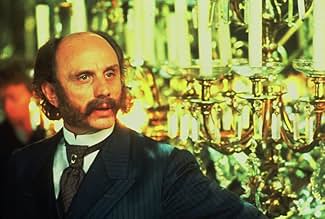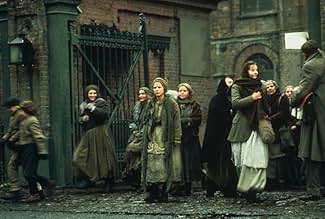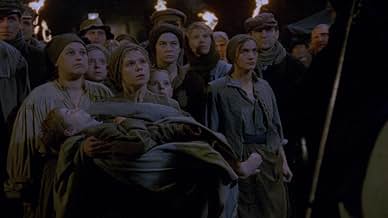Daens
- 1992
- 2h 18m
Ajouter une intrigue dans votre langueIn the 1890s, Father Adolf Daens goes to Aalst, a textile town where child labor is rife, pay and working conditions are horrible, the poor have no vote, and the Catholic church backs the pe... Tout lireIn the 1890s, Father Adolf Daens goes to Aalst, a textile town where child labor is rife, pay and working conditions are horrible, the poor have no vote, and the Catholic church backs the petite bourgeoisie in oppressing workers. He writes a few columns for the Catholic paper, an... Tout lireIn the 1890s, Father Adolf Daens goes to Aalst, a textile town where child labor is rife, pay and working conditions are horrible, the poor have no vote, and the Catholic church backs the petite bourgeoisie in oppressing workers. He writes a few columns for the Catholic paper, and soon workers are listening and the powerful are in an uproar. He's expelled from the Cat... Tout lire
- Nommé pour 1 oscar
- 10 victoires et 4 nominations au total
- Eugene Borremans
- (as Idwig Stephane)
- Elizabeth Borremans
- (as Linda van Dijck)
- Mayor Vanwambeke
- (as Fred van Kuijk)
Avis en vedette
Together with his brother he faced and defeated the rich. He helped the poor people and got them the right to vote. In his quest he the pope and all who were against him eventually took away his rights as a priest.
Daens continued to help the poor, and became the voice of the people in the parliament. He was a good man who stood up for the poor.
The movie itself gives a very good look how people worked their asses of for only a few CENTS.
In comparison to Schindler's list I gave Daens 9 points versus 1 for Schindler. I saw this movie at least 7 times. To tell you the truth I dragged all my friends to see this movie on full screen. They were all in awe, nobody complained, on each occasion we needed a brandy to recuperate :-) This is the first movie I saw men weep.
The film 'Daens' portrays the struggle of a courageous man to spread the gospel of Christ to impoverished and exploited textile workers in late 19th Century Belgium. His main enemies are the 'Godless' socialists who offer his flock a more earthly paradise and also his own Church hierarchy who stand fast with the capitalist class in opposing all attempts at social reform. Daens follows the dictates of conscience, founds his own Catholic People's Party and becomes a charismatic leader of the Flemish-speaking poor whose interests are largely ignored by the French-speaking Christian Democrats. This official Church-backed Catholic Party is dominated by capitalists who see religion as a means of social control and property-protection.
The scene is set for conflicts of conscience, class and language. How should the Church respond to the new evils of capitalism? Daens, of course, is only trying to follow the spirit of the Holy Father's encyclical 'Rerum Novarum' (1891) which endorsed state regulation to curb the worst abuses of industrialism. Complaints from the Belgian hierarchy result in Daens being summoned to Rome to explain himself. He never gets to meet the Pope and is eventually excommunicated for his disobedience to his local hierarchy.
Echoes here of 'Liberation theology' and Pope John Paul II publicly rebuking a Sandinista priest in Nicaragua for his political activities. Echoes also of Martin Luther's stand against different abuses 400 years earlier.
There is a great deal going on in this film and its subject matter is difficult and obscure. Nevertheless 'Daens' successfully portrays the man and his milieu in an entertaining way. The film held my interest throughout and it spurred me to research the topic further. Its depiction of living and working conditions is exemplary and the industrial accident scene is harrowing. The subplot focusing on a working girl's attraction to both the Church and to a young socialist radical encapsulates the wider struggle being played out on the political stage.
The inferior position of Flemish in Belgian society at that time is shown by the mainly Flemish dialogue used between Daens and his flock and the mainly French dialogue used between Daens and his Church and social superiors and within the Belgian parliament. The parliamentary Commission of Enquiry into working conditions is unable to question the Aalst workers properly because of this language barrier.
Sexual harassment of women in the workplace which used to be so commonplace is shown by a particularly strong rape scene.The fact that the perpetrator is a factory foreman underlines both 'capitalist lackey' and 'corruption of power' themes.
The film gives some insight into the tremendous hostility which developed between the European Left and the Catholic Church from the French Revolution onwards. The Church under the recently sanctified Pius IX (1846-1878) turned its back on everything modern. The Left turned its back on a Christian religion whose main institution resisted all the new ideas thrown up by tremendous social change. These are the big themes against which the Daens drama is acted out.
And acted out well it certainly is. Jan Decleir gives a powerful performance as the eponymous hero. The reverence of simple Catholic workers for their Church, their suspicion of socialism but desire for better conditions together provide the springboard for the short-lived Daens success story. This complex social dynamic is beautifully depicted in intimate scenes in which individual relationships are used to explain the wider picture. The film is always in danger of collapsing under the weight of the historical events it depicts. This never quite happens and it is hard to envisage a better screenplay for a film of this length and difficulty of subject.
The Daens theme is with us still. Archbishop Romero was killed by right-wing gunmen for supporting the poor. The Catholic archbishop of Recife in Brazil famously said,
"When I say, 'Feed the poor' they call me a saint. When I ask, 'Why are they poor?' they call me a Communist."
Having consigned Communism to the dustbin of History (at least temporarily?), Pope John Paul II spent his last years railing against capitalist materialism and economic inequality. In my opinion, Catholics will only solve this dilemma when they are able to reconcile Scripture with the Enlightenment and absorb Marxist and other secularist critiques of global capitalism into their faith. Unfortunately their Church over the last two centuries has usually backed the powerful against the weak, the rich against the poor. Daens is an example of thousands of individual Catholics world-wide who have taken simple Christian teachings at their face value to follow their own conscience. Equally, there is no compelling reason for the Left to maintain its historic antipathy towards religion. Christianity and Socialism are natural bedfellows.
For a non-Belgian audience with a poor knowledge of history 'Daens' could be a difficult film to enjoy. I hope that this review will help more people to access it and understand the powerful light it throws on much wider religious and political issues. A Daens website in Belgium shows that this man still has his local fans but it would be too much to expect the Church to lift its ban of excommunication, let alone consider him as a candidate for beatification. The Church has recently apologised for the way it treated Galileo, so who knows? That is entirely a matter for the Church but I would urge anyone interested in religion, history and politics to watch this film. I eagerly await its DVD format.
The story is about a courageous, socially feeling priest who went against church authorities and the political powers that be (heavily interlinked at the end of the 19th century) to help the impoverished workers of Aalst, Belgium. Although romanticised somewhat, and even with the addition of certain characters to strengthen the dramatic arc of the movie, this is based on a true story. Coninx did absolutely amazing things with a limited budget to bring the era back to life, and his camera lingers tellingly in the dirty, narrow little streets where the workers were packed together, entire families with hordes of children living in one room. We also get to see the factories, dangerous places, where people spend twelve or more hours a day for scraps off the tables of the wealthy factory owners. All of this is brought to life in a completely convincing way, immersing you in the period.
Coninx' control as a director here is remarkable. Without any real money (certainly by US standards), he manages to pull off a story of epic scope that looks and feels exactly as it should. Consider a scene set in the palace of the king, where an opulent dinner is going on, served by black people brought over from what was then Belgian Congo. "Are they dangerous?," one of the women asks. Lesser directors might have hammered the point home by going on about it, but Coninx doesn't. He lets this one simple line stand, lets it speak for itself and moves on. This way, he's able to pack in a surprising amount of stuff in the 135 minutes running time, and it doesn't feel rushed or hurried, but on the other hand, very natural. Visually too, this scene is as striking as any, showcasing the luxury of the wealthy as opposed to the squalor of the poor. And again Coninx doesn't make a point of it, he doesn't give in to the temptation of making self-conscious cuts or moving the camera that way. He just lets it be, keeps things simple.
Jan Decleir gives a powerful performance as Adolf Daens, who comes off as a brilliant orator, an almost saintly figure who heeds no warnings and goes on in the face of public humiliation, ex-communication and even physical violence. This is probably a simplification of the truth (it's hard to believe anyone is THAT perfect), but the power Decleir brings to the role makes it work.
There are some minor problems, however. The screenwriters and directors seem to have a somewhat naive belief in the socialist party of the time, as a well-meaning boys' club that basically says the same things Daens says throughout the movie. And there are some scenes that feel phony, such as an unbelievably corny moment in a field, when one the characters rides along on a bike, yelling extacically that Daens has just been elected to parliament. Cut to a shot of an old man falling to his knees with pure joy, as the triumphant music swells. Sorry, but that's just a bit too much.
All in all this is a movie deserving of its status as classic in Belgium, and very much worth seeing where ever you're from. Back here, we've been beaten over the head with this movie so many times that a lot of people must almost know it by heart, but then that's not the movies fault.
Le saviez-vous
- AnecdotesFilm debut of Matthias Schoenaerts.
- Autres versionsThere is a version spanning a total of 196 minutes. Mostly shown as a four part mini-series.
- ConnexionsFeatured in Zomergasten: Episode #8.1 (1995)
Meilleurs choix
- How long is Daens?Propulsé par Alexa
Détails
- Date de sortie
- Pays d’origine
- Langues
- Aussi connu sous le nom de
- Priest Daens
- Lieux de tournage
- sociétés de production
- Consultez plus de crédits d'entreprise sur IMDbPro
Contribuer à cette page


























